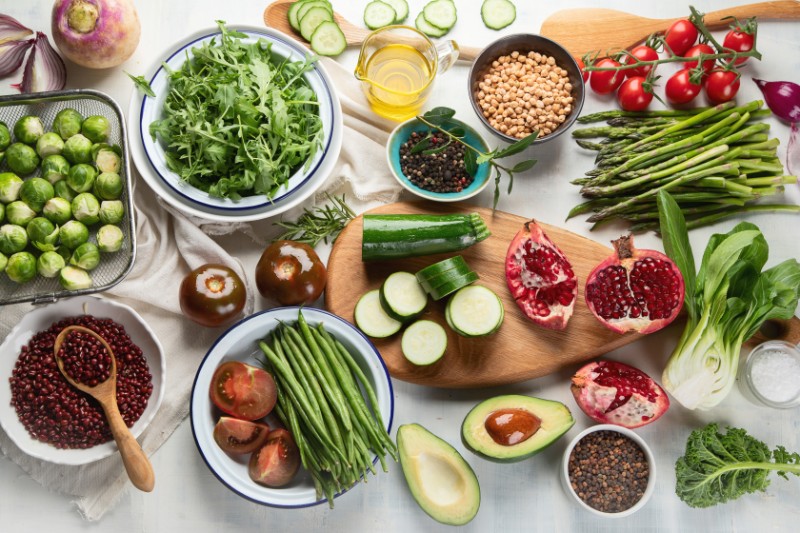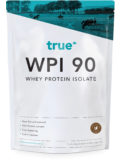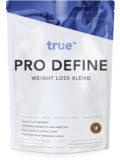Women face plenty of changes in their body during pregnancy. There is a rollercoaster of emotions caused by the higher intensity hormones flowing through their body and, if that wasn’t enough, worries and expectations about the baby can flood a new mum’s thoughts. To mitigate these concerns, we’ve put together some tips to help you get through this amazing journey.
One of the first things to do when you are trying to fall pregnant or just after the positive result is to evaluate your food habits. “Women shouldn’t eat for two, but rather consume the essential nutrients for mums and babies health. It is about quality not quantity”, recommends Roslyn Yee, True Protein’s in-house Accredited Sports Dietitian, who recently delivered her first baby.
Look after your body
Steady weight gain during pregnancy is, of course, expected for the health of both mother and baby. However, it’s important not to gain too much weight. Medical follow-up for the assessment of each patient’s weight gain is important, but if you are pregnant, a good approach is to eat to satisfy your appetite and continue to monitor your weight.
For those women who are already a healthy weight, it is usually recommended to gain between 11.5 and 16 kg. Underweight women may need to aim higher, between 12.5 and 18 kg. In case of anyone overweight, remember that pregnancy is not the time to start dieting or trying to lose weight. However, it is recommended for women who are overweight to keep weight gain to a minimum during pregnancy (between 5 and 11.5 kg).
In order to maintain appropriate weight gain during pregnancy, it is important to choose healthy foods from the five food groups (carbohydrates, protein, dairy products, fruit and veggies, good fats) and limit discretionary foods and drinks high in saturated fat, added sugars and added salt (such as cakes, biscuits and sugary drinks). Always remember: the more foods you peel rather than unwrap, the better for your health!
Now is the time to pay extra attention to what you put on the plate and make sure you are enjoying a variety of fruits and vegetables of different types and colours. “Increasing the ingestion of grains and cereal is also recommended, especially wholegrain and high fibre options. Choosing foods that are high in iron, such as green leaves, black beans and lean meat is also great to avoid any deficiencies in minerals that are important to baby’s development. Don’t forget to keep eating and drink foods rich in calcium, like milk, hard cheese and yoghurt, or calcium-enriched alternatives. Reduced fat varieties are best”, Roslyn recommends.
Just as important as choosing what you should eat during pregnancy is also what you shouldn’t put on your plate. Here are some foods we recommend avoiding, for the health of both mum and baby.
-
Processed meats such as ham and salami
-
Any raw meat or seafood, cold poultry
-
Refrigerated pate or meat spreads
-
Soft and semi soft cheese (brie, camembert, ricotta, fetta, blue etc.)
-
Processed cheese
-
Don’t drink or use unpasteurized milk
-
When consuming pasteurized milk, cream or yoghurt: check best before or Use By date and follow storage instructions

Vitamin Supplementation
In order to ensure healthy growth and development for the baby, especially during the first three months of pregnancy, most women are recommended by their doctors to take extra doses of folate and acid folic. Folate is found naturally in food, such as green leafy vegetables, and as ‘folic acid’ when it is added to food, for example bread and breakfast cereals, or used in dietary supplements. Folate has been proven to be particularly important for the development of the nervous system and for preventing Neural Tube Defects (NTDs) in babies.
Due to widespread iodine deficiency in Australia, iodine supplementation is also recommended throughout pregnancy to help promote steady brain development. “The recommended dose is 150mcg per day. A well-balanced diet can provide you with most of the nutrients needed prior to and during pregnancy. Supplementation may be required for iron, vitamin B12, vitamin D and calcium if you are at specific risk of deficiency. However, it is important to point out that supplementation of vitamins, minerals or any other nutritional substance should first be discussed with your doctor as high dosages may be harmful”, highlights Roslyn.
Keep moving
Whether you were a gym addict or not before conception, choosing an exercise regime that suits best your rhythm of life will certainly be helpful to maintain healthy weight gain and good stretching. As exercise releases endorphins, a hormone known to reduce stress levels, it helps to keep you relaxed and in a good mood during pregnancy.
Pelvic floor exercises are also good to get your body prepared to give birth and can be combined with any lifestyle or exercise level during pregnancy. They help to strengthen and improve the tone of the pelvic muscle, which provide perineal support for pelvic structures. There is strong evidence to suggest that women who do intensive, supervised pelvic floor exercise during pregnancy may reduce the risk of urinary incontinence postpartum.
If you were inactive prior to pregnancy, try beginning with low intensity activities such as walking or swimming, and progressing to the lower end of the range recommended in Australia - 150 minutes per week or 30 minutes per day of moderate intensity activity.
Women who were active prior to conceiving who are experiencing an uncomplicated pregnancy should just keep going, respecting their own limits until such time that it becomes uncomfortable to do so.
“It is important to remind women that exercise during pregnancy does not increase the risk of adverse pregnancy or birth outcomes, not even for elite athletes. However, sports women should have their physical activity regime overseen and managed by an expert health care provider to ensure the safety and wellbeing of the mother and her unborn child. This is particularly important in cases where the foetus is small for gestational age”, points out Roslyn.
General benefits of physical activity during pregnancy
-
Improved muscular strength and endurance
-
Improved cardiovascular function and physical fitness
-
Decrease in risk of pregnancy-related complications such as hypertension and pre-eclampsia
-
Reduced back and pelvic pain
-
Reduced fatigue, stress, anxiety and depression
-
Decrease in excessive gestational weight gain
-
Fewer delivery complications
Don’t forget to mention to your doctor that you are willing to exercise, because there are a couple of contradictions to physical activity during pregnancy that might cause concern such as ruptured membranes, signs of preterm labour, hypertensive disorders of pregnancy, inhibited growth, high order multiple gestation, previous spontaneous abortion or preterm birth, cardiovascular or respiratory disorder, anaemia. These situations require professional collaboration between medical and training professionals to ensure that women exercise with caution or at a low level provided they are asymptomatic at rest.
Conclusion
Pregnancy is a beautiful time in a woman’s life and should be celebrated and enjoyed rather than feared. By keeping to the usual recommendations of a healthy and balanced life and consulting with health professionals, a healthy and stress-free pregnancy can be achieved.









 Meal Preps
Meal Preps
 Nutrition Tips
Nutrition Tips
 Exercise
Exercise
 News & Updates
News & Updates
 Lifestyle
Lifestyle






Leave a comment